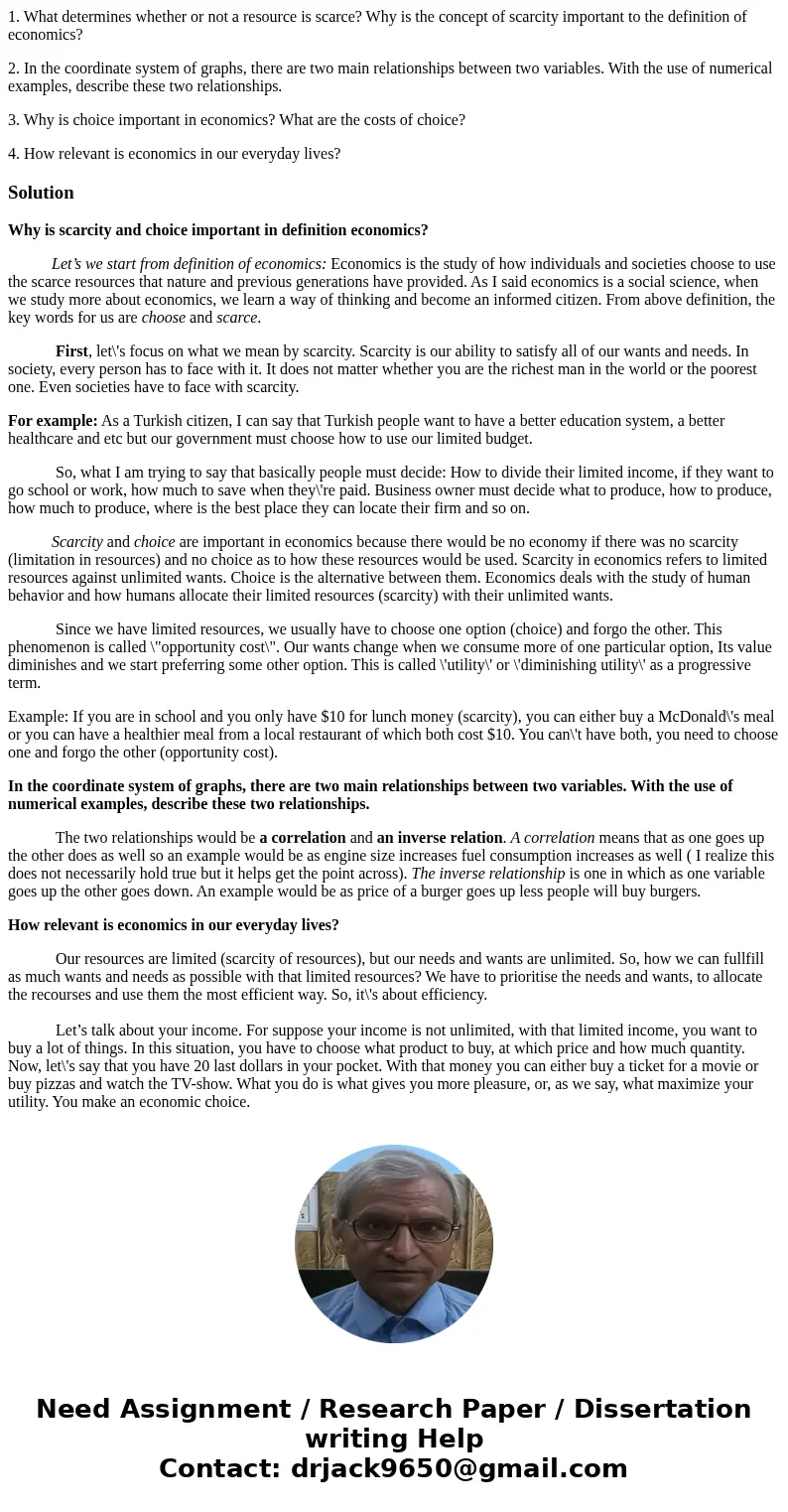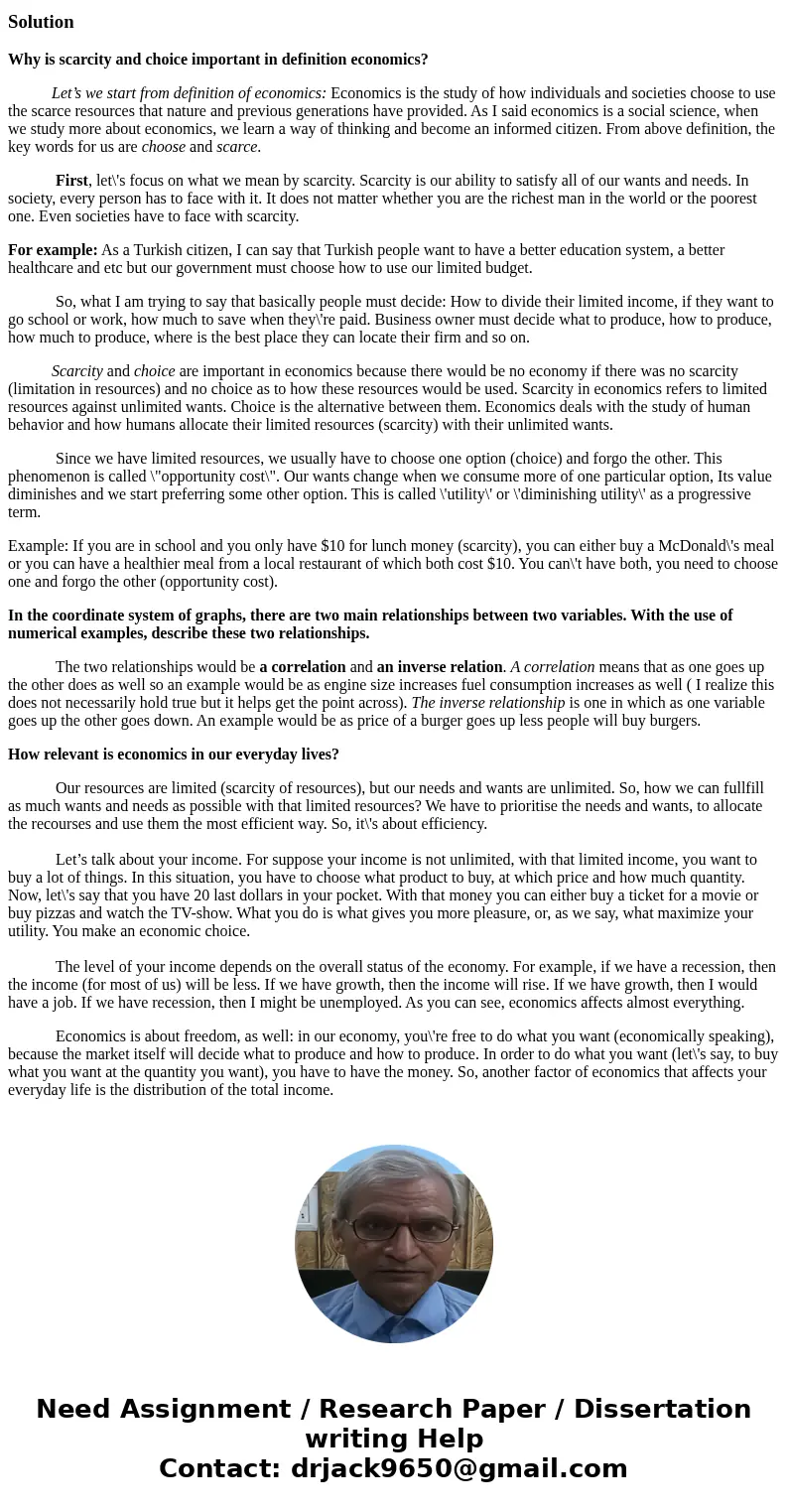1 What determines whether or not a resource is scarce Why is
1. What determines whether or not a resource is scarce? Why is the concept of scarcity important to the definition of economics?
2. In the coordinate system of graphs, there are two main relationships between two variables. With the use of numerical examples, describe these two relationships.
3. Why is choice important in economics? What are the costs of choice?
4. How relevant is economics in our everyday lives?
Solution
Why is scarcity and choice important in definition economics?
Let’s we start from definition of economics: Economics is the study of how individuals and societies choose to use the scarce resources that nature and previous generations have provided. As I said economics is a social science, when we study more about economics, we learn a way of thinking and become an informed citizen. From above definition, the key words for us are choose and scarce.
First, let\'s focus on what we mean by scarcity. Scarcity is our ability to satisfy all of our wants and needs. In society, every person has to face with it. It does not matter whether you are the richest man in the world or the poorest one. Even societies have to face with scarcity.
For example: As a Turkish citizen, I can say that Turkish people want to have a better education system, a better healthcare and etc but our government must choose how to use our limited budget.
So, what I am trying to say that basically people must decide: How to divide their limited income, if they want to go school or work, how much to save when they\'re paid. Business owner must decide what to produce, how to produce, how much to produce, where is the best place they can locate their firm and so on.
Scarcity and choice are important in economics because there would be no economy if there was no scarcity (limitation in resources) and no choice as to how these resources would be used. Scarcity in economics refers to limited resources against unlimited wants. Choice is the alternative between them. Economics deals with the study of human behavior and how humans allocate their limited resources (scarcity) with their unlimited wants.
Since we have limited resources, we usually have to choose one option (choice) and forgo the other. This phenomenon is called \"opportunity cost\". Our wants change when we consume more of one particular option, Its value diminishes and we start preferring some other option. This is called \'utility\' or \'diminishing utility\' as a progressive term.
Example: If you are in school and you only have $10 for lunch money (scarcity), you can either buy a McDonald\'s meal or you can have a healthier meal from a local restaurant of which both cost $10. You can\'t have both, you need to choose one and forgo the other (opportunity cost).
In the coordinate system of graphs, there are two main relationships between two variables. With the use of numerical examples, describe these two relationships.
The two relationships would be a correlation and an inverse relation. A correlation means that as one goes up the other does as well so an example would be as engine size increases fuel consumption increases as well ( I realize this does not necessarily hold true but it helps get the point across). The inverse relationship is one in which as one variable goes up the other goes down. An example would be as price of a burger goes up less people will buy burgers.
How relevant is economics in our everyday lives?
Our resources are limited (scarcity of resources), but our needs and wants are unlimited. So, how we can fullfill as much wants and needs as possible with that limited resources? We have to prioritise the needs and wants, to allocate the recourses and use them the most efficient way. So, it\'s about efficiency.
Let’s talk about your income. For suppose your income is not unlimited, with that limited income, you want to buy a lot of things. In this situation, you have to choose what product to buy, at which price and how much quantity. Now, let\'s say that you have 20 last dollars in your pocket. With that money you can either buy a ticket for a movie or buy pizzas and watch the TV-show. What you do is what gives you more pleasure, or, as we say, what maximize your utility. You make an economic choice.
The level of your income depends on the overall status of the economy. For example, if we have a recession, then the income (for most of us) will be less. If we have growth, then the income will rise. If we have growth, then I would have a job. If we have recession, then I might be unemployed. As you can see, economics affects almost everything.
Economics is about freedom, as well: in our economy, you\'re free to do what you want (economically speaking), because the market itself will decide what to produce and how to produce. In order to do what you want (let\'s say, to buy what you want at the quantity you want), you have to have the money. So, another factor of economics that affects your everyday life is the distribution of the total income.


 Homework Sourse
Homework Sourse